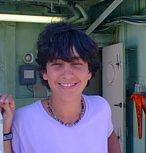DNA reveals the past and future of coral reefs
New DNA techniques are being used to understand how coral reacted to the end of the last ice age in order to better predict how they will cope with current changes to the climate. James Cook Univer

From 2005 to 2022, the main node of the ARC Centre of Excellence for Coral Reef Studies was headquartered at James Cook University in Townsville, Queensland (Australia)








Abstract: Population connectivity is one of the criteria in the design of networks of MPAs. For marine benthic invertebrates, most of which are sessile or near sessile, larval transport is a significant driver of population connectivity. However, the prediction of larval transport presents a major challenge because larvae cannot be tracked in the field. Our research measures larval behaviours in tractable laboratory experiments that can explain larval distributions observed in the field and can be included in biophysical models to predict larval transport.
Biography: Dr. Anna Metaxas is a Professor in Oceanography at Dalhousie University. She completed her BSc in Ecology at McGill University, her Msc in Oceanography at UBC, and her PhD in Marine Ecology at Dalhousie University. She was a postdoctoral fellow at Harbor Branch Oceanographic Institution in Florida and a postodoctoral scholar at Woods Hole Oceanographic Institution in Massachusetts, before returning to Dalhousie. Her research focuses on the factors that regulate populations of benthic marine invertebrates, particularly early in their life history. She uses a combination of approaches, such as field sampling, laboratory experiments and mathematical modelling, to study organisms of ecological and economic importance, such as invasive species. She has worked in a variety of habitats from shallow rocky subtidal regions to the deep-sea, including hydrothermal vents and deep-water corals, in temperate and tropical regions of the world. Her research has implications for marine conservation, such as the establishment and success of conservation areas for benthic populations. She has served on several national and international steering and scientific advisory com¬mittees (e.g. Canadian Healthy Oceans Network, COML-ChEss, Ridge 2000, Endeavour MPA, InterRidge, Excellence Cluster Future Ocean) and is currently the chair of the Population Connectivity working group of INDEEP (International network for scientific investigation of deep-sea ecosystems) and the co-director of the Transatlantic Ocean System and Technology graduate program. All of these initiatives have as an ultimate goal the translation of scientific outcomes into information that is relevant to policy.
New DNA techniques are being used to understand how coral reacted to the end of the last ice age in order to better predict how they will cope with current changes to the climate. James Cook Univer
A new study on the effects of climate change in five tropical countries has found fisheries are in more trouble than agriculture, and poor people are in the most danger. Distinguished Profess
James Cook University researchers have found brightly coloured fish are becoming increasingly rare as coral declines, with the phenomenon likely to get worse in the future. Christopher Hemingson, a
Researchers working with stakeholders in the Great Barrier Reef region have come up with ideas on how groups responsible for looking after the reef can operate more effectively when the next bleaching
Abstract: As marine species adapt to climate change, their heat tolerance will likely be under strong selection. Individual variation in heat tolerance and its heritability underpin the potential fo
Abstract: The Reef Ecology Lab in KAUST’s Red Sea Research Center explores many aspects of movement ecology of marine organisms, ranging from adult migrations to intergenerational larval dispersal
Abstract: Macroalgal meadows are a prominent, yet often maligned component of the tropical seascape. Our work at Ningaloo reef in WA demonstrate that canopy forming macroalgae provide habitat for ad
Abstract: Sharks are generally perceived as strong and fearsome animals. With fossils dating back at least 420 million years, sharks are not only majestic top predators but they also outlived dinosa
Abstract: Connectivity plays a vital role in many ecosystems through its effects on fundamental ecological and evolutionary processes. Its consequences for populations and metapopulations have been
Abstract: Evolution of many eukaryotic organisms is affected by interactions with microbes. Microbial symbioses can ultimately reflect host’s diet, habitat range, and even body shape. However, how
Abstract: The past few years have seen unprecedented coral bleaching and mortality on the Great Barrier Reef (GBR) but the consequences of this on biodiversity are not yet known. This talk will expl